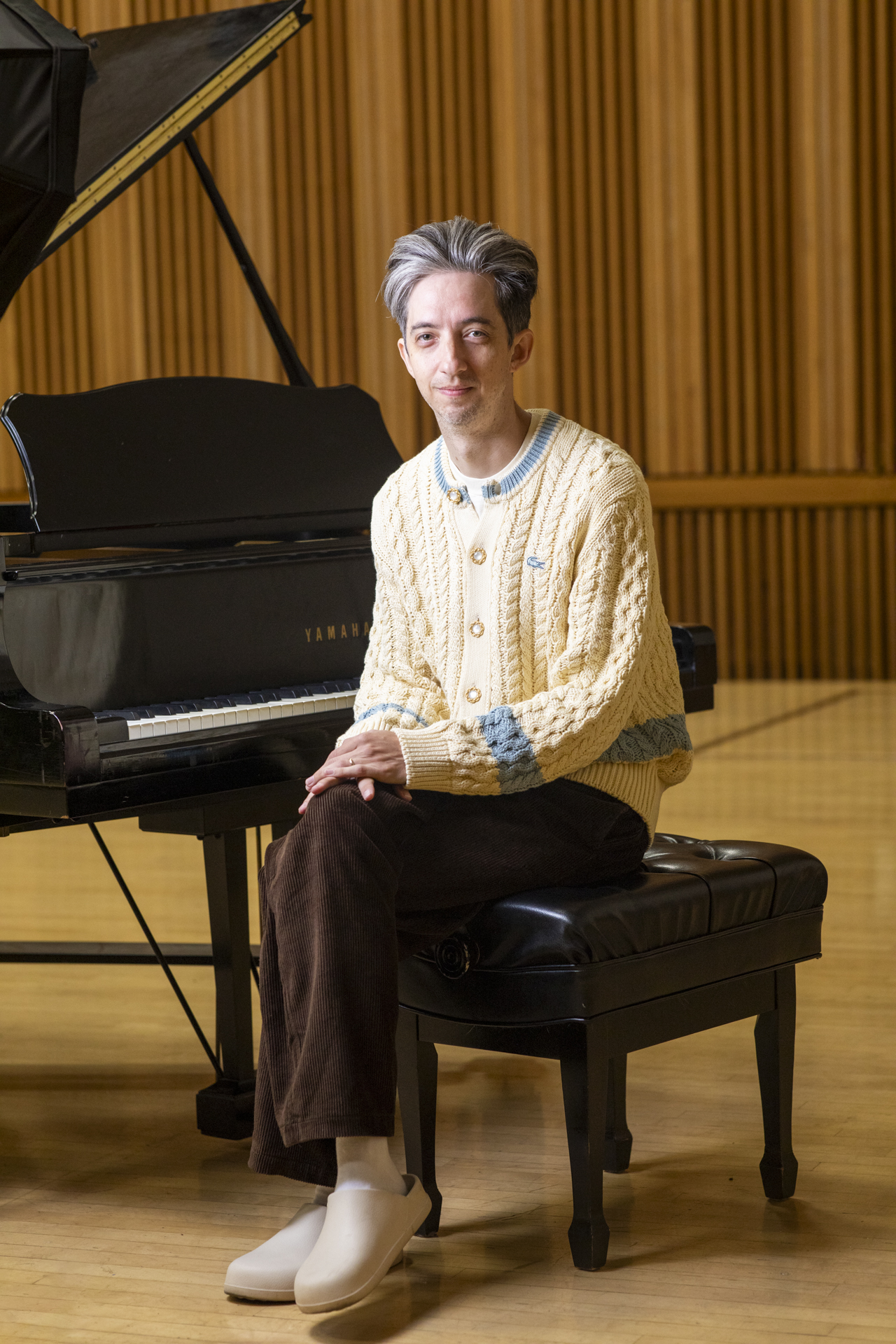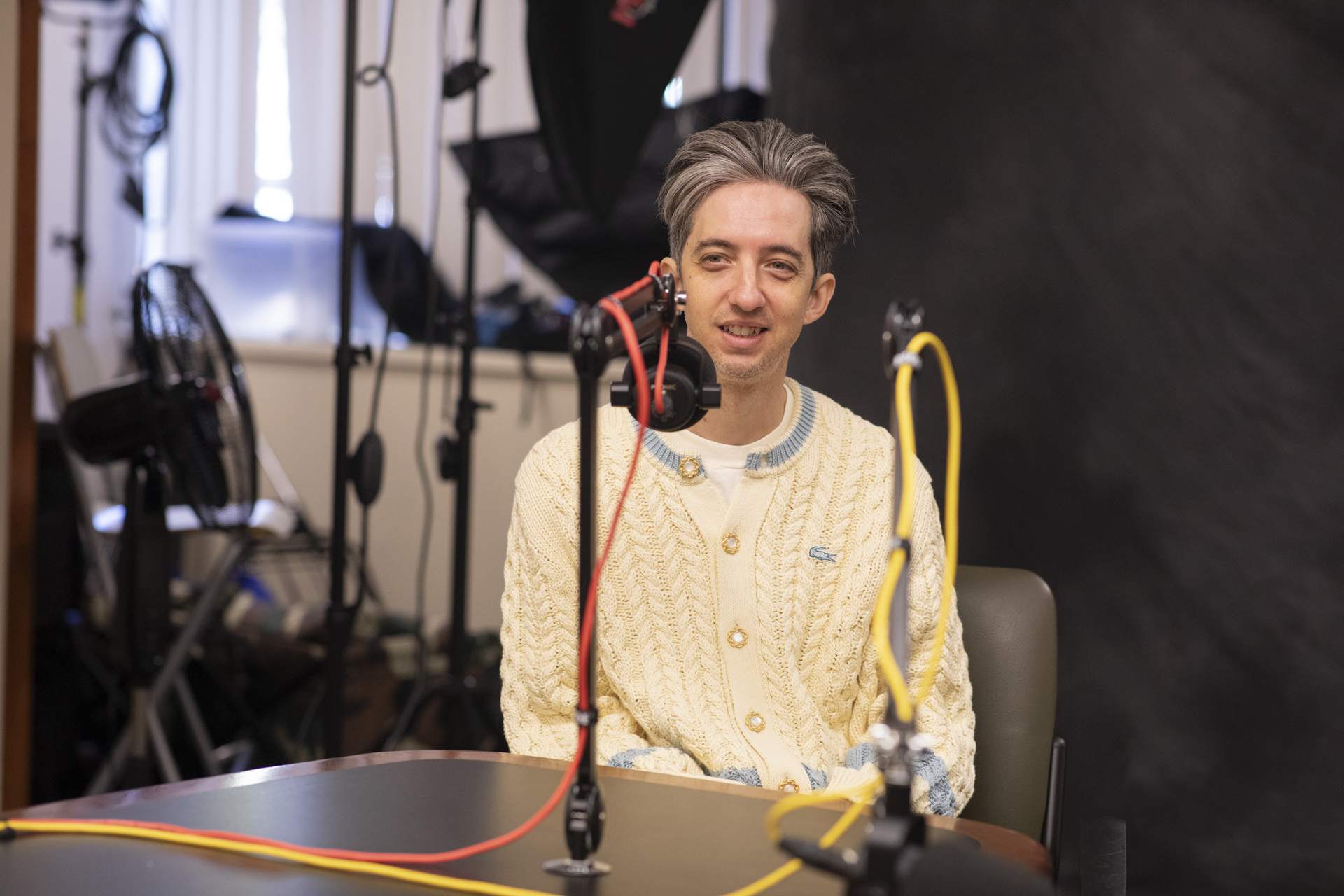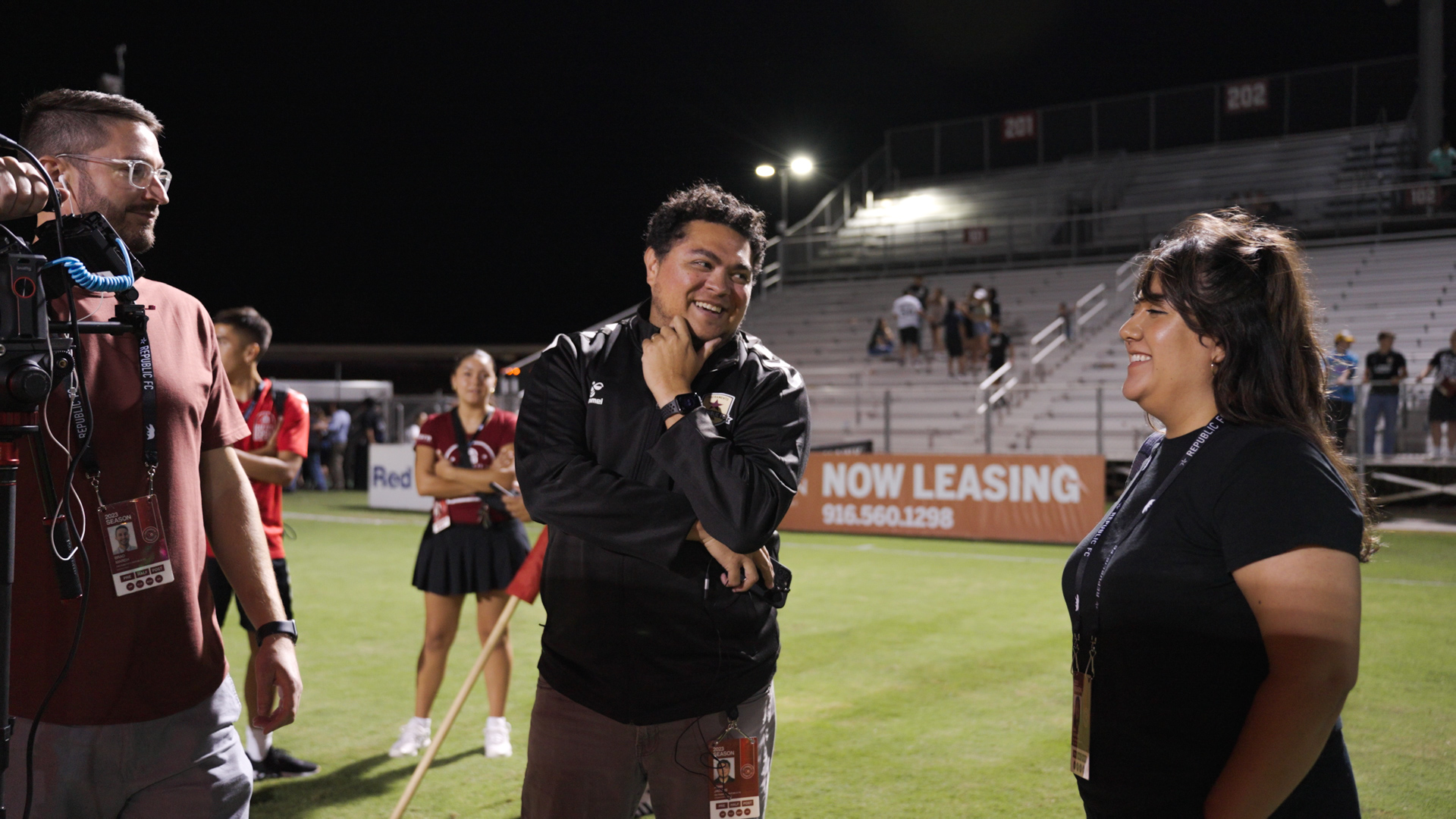Story Content
On acclaimed podcast, Cole Cuchna dissects pop music using his love of research and his Sac State degree
December 06, 2023
When Cole Cuchna ’15 (Theory/Composition) was a Sacramento State student studying music theory, he learned something about himself that would prove life changing.
“What I fell in love with, unpredictably, was writing about music,” Cuchna said. “When you take music history classes, you write a full essay on a Beethoven work or a Shostakovich symphony, and when you do that, you have to research the composer and research what was going on at that time when they wrote this piece of music. And then you analyze the piece itself.
“I really fell in love with the research process.”

That love led to an unlikely career: Cuchna is the host of “Dissect,” a podcast that spends each season analyzing a single album of popular music, song by song, line by line, and note by note. It’s a concept that he says can be traced directly back to his time at Sac State.
Launched in 2016 and since 2018 produced by Spotify, “Dissect” was named the best podcast of 2018 by the New York Times and among the top 50 podcasts that same year by Time magazine and The Guardian. The show has typically examined hip-hop and R&B artists including Kendrick Lamar, Kanye West, and Beyoncé, though Cuchna has explored music from comedian Bo Burnham and, most recently, alternative rock band Radiohead.
Podcasting is not something Cuchna ever envisioned himself doing. The medium was new when he graduated high school. He had pursued music since taking up guitar when he was 13, and twice dropped out of community college to focus on his music career.
By his mid-20s, Cuchna was in a band but souring on the idea of life as a touring musician and feeling that he had reached a limit in what he could teach himself about music. To get the formal education he felt he needed, he enrolled at Sac State.
“In retrospect, it was pretty naïve thinking,” Cuchna said. “I had no formal training, and everyone at the collegiate level for the most part has been schooled, educated in music at that point. … There was just a huge learning curve.”
Cuchna employed a bit of trickery to get admitted, using notation software to create sheet music of a piano piece he had written himself. Then, during his audition, he set out the pages and proceeded to perform the piece from memory to create the false impression he knew how to read music.
With that deception behind him, however, he focused on getting up to speed, spending most of his days in Capistrano Hall. The small Music Composition program, he said, allowed him to develop strong one-on-one relationships with professors and a sense of camaraderie with fellow students.
“I had some really great professors that gave me great feedback on essays and encouraged me, and did tell me, ‘The quality of the paper you’re writing is different,’ ” he said. “That was definitely encouraging to hear.”
Something else he learned, however, was that a massive wall existed between classical and popular music. He and his classmates spent hours analyzing a symphony by Beethoven, but such effort was mostly absent for music by contemporary artists, at Sac State or anywhere else.

School of Music Director Stephen Blumberg called Cuchna “one of my very best composition students in all of the almost 30 years I’ve been at Sac State,” one who came to the University as a rock musician but whose skills in all aspects of classical music and theory grew tremendously during his time on campus.
Cuchna, Blumberg said, was a unique and original composer who also excelled in his other classes and “developed enormously” as a pianist. “Dissect,” Blumberg said, is the perfect combination of Cuchna’s skills, interests, and expertise deployed effectively to bring meaningful insight to his audience.
“He has blazed his own trail, finding a path that truly harmonizes with his vision,” Blumberg said. “Teachers sometimes talk about how they learn from their students, and that’s true, you learn while you’re teaching. But to be able to really turn the tables and become the student learning from your former student, that’s a unique experience that is very moving, which is how I feel when I listen to episodes of ‘Dissect.’ ”
Cuchna graduated in 2015, pursued a short solo career, then worked as a barista. But his desire to bridge the classical and pop worlds persisted.
Then, the day after his daughter was born, he experienced an epiphany. Rocking his newborn at home, he listened on his headphones to Kendrick Lamar’s “To Pimp a Butterfly,” released just two days earlier. The album made a deep impression, and he wanted to learn more about it.
“ ‘Dissect’ was started for that album,” Cuchna said.
He remembered his love of writing essays and conducting deep research about music. That coincided with the growing popularity of podcasting, which had been around for a decade. It was the perfect medium, he felt, for long-form analysis of an audio art.
“Music conveys the human experience, and the output of that is different, because the circumstances of our lives are different, but if you boil it down, the essence is the same across time, across genres, across any art form, across mediums.” -- Cole Cuchna
“Dissect” launched in 2016, with 22 episodes about “To Pimp a Butterfly” that Cuchna researched, wrote, and recorded in his walk-in closet. He followed that in 2017 with a season about Kanye West’s “My Beautiful Dark Twisted Fantasy.” The next year, Spotify purchased the show, finally allowing Cuchna to quit his job as a barista and focus on podcasting full time.
Now, with 11 seasons and three “mini seasons” under his belt, he employs a team that conducts additional research and analysis and recreates the music he is analyzing so he can break it down more easily.
It still is, however, recorded in his closet.
Cuchna brings the entire breadth of his musical knowledge and education to “Dissect.” Radiohead’s “Nude,” he explained, is simultaneously in the keys of E major and C-sharp minor, reflecting its theme of hope versus despair.
The track to Tyler, the Creator’s “I THINK” is a mashup of two Nigerian dance songs, a nod to his heritage. In “All Eyes on Me,” Bo Burnham utilizes the pentatonic scale, known for its dreamlike and hypnotic qualities, as the protagonist sings about giving into depression.
Though his personal music tastes lean toward Radiohead, for “Dissect” Cuchna has primarily gravitated toward hip-hop and R&B, both because he wanted to explore their relationship to contemporary issues – much as his college essays explored the political and cultural contexts in which classical music was created – and because he felt the genres were, unfairly, not seen as serious music worth analyzing.
"There's not a lot of scholarly research on (hip-hop) or even analysis on it, which to me does a disservice to the genre,” he says on Sacramento State’s “Made at Sac State” podcast. “Part of why I've done hip-hop a lot on the show is exactly for that reason, to hopefully start conversations about this music that people are actually listening to that is also great and really speaks to this moment in history."
In many ways, Cuchna has come full circle from his days as a Sac State student. Each episode essentially is, an extremely well-researched essay read aloud, though now enhanced by musical snippets, interviews with the artists, and other audio material.
That “Dissect” is a success also means he has contributed in a significant way toward his goal of bridging the gap between classical and popular music.
“Great music is great music to me,” Cuchna said. “Music conveys the human experience, and the output of that is different, because the circumstances of our lives are different, but if you boil it down, the essence is the same across time, across genres, across any art form, across mediums.”


